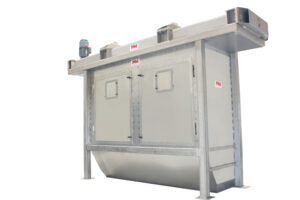CSS Product Brochure

To find out more about our Cross Stream Sampler, please download the product brochure:
The Cross Stream Sampler (CSS) extracts a representative increment/cut of bulk material from a free-falling stream at the discharge point of a conveyor belt.
Representativity of the increment is ensured by extraction of a complete cross section of the material stream.
Variant 1: The Cross Stream Sampler Chain (CSS-C) is driven by a robust chain system.
Variant 2: The Cross Stream Sampler Wire (CSS-W) is driven by a robust wire system. The CSS-W is preferable for material containing large amounts of dust or fine particles. The CSS-W is well suited for materials like biomass, limestone powder etc.
The Cross Stream Sampler (CSS) is:
Download the Cross Stream Sampler brochure here
At M&W JAWO Sampling, we understand that every industry has unique sampling requirements. That’s why we offer customized sampling solutions to meet your specific needs. Our team of experts will work with you to design a sampling solution that is tailored to your industry and application.
If you’re looking for an automatic falling stream sampler, M&W Cross Stream Sampler is the perfect solution. It’s reliable and provides representative sampling with accurate and consistent results. So why wait? Contact us, and get started on the process of designing a Cross Stream Sampler for your plant today!
Another of Mark & Wedells sampling systems is the Cross Stream Cutter, that is designed to occupy less space than the Cross Stream Sampler.

To find out more about our Cross Stream Sampler, please download the product brochure:

The CSS consists of a railing system translating a suspended bucket cutter with a bottom-hinged discharge port. A robust drive (chain/wire) is connected to a gear motor on top of the rails. The motor control ensures that the cutter moves at a constant speed of up to 0.6 m/s when cutting a transverse increment from the falling material stream.
The CSS is enclosed in a cover housing to avoid incoming contamination.
Hatches on top and on the side of the housing allow easy access for inspection and cleaning.
The cutter is parked above the sample discharge port to prevent entrance of non-sampled material. When an increment is requested, the carriage first moves through the material stream with the discharge port open, allowing the process stream material to pass through the cutter unaffected. At the turning point, the discharge port is closed, allowing the cutter to be filled on the return journey. The cutter is accelerated, and decelerated, to/from a constant cutting velocity well outside the active sampling zone. After the cutter is slowed down and parked above the parking position, an activator opens the discharge port which releases the extracted increment.
A typical increment volume is between 25 and 100 l.
Options
1. The M&W central control cabinet can exchange signals with the client’s control system.
2. The CSS can be delivered with a vertical 90° tilted railing system if space constraints is an issue.
3. The CSS can be delivered with a main support structure.
4. The CSS can be delivered with a complete housing-enclosure. An enclosure can be required if the material has to be contained inside the sampler, especially for dusty material.
5. The CSS can be delivered with a duct that can lead the mainstream material further in the process stream.
Nota Bene 1
Cross Stream samplers can be calibrated with respect to the client’s material(s) and local sampling conditions. M&W offer clients a facility for quantitative assessment of the performance of CCS on the client’s own material(s), following one or several types of tests, the Replication Experiment test, or variographic characterisation of process sampling performance.